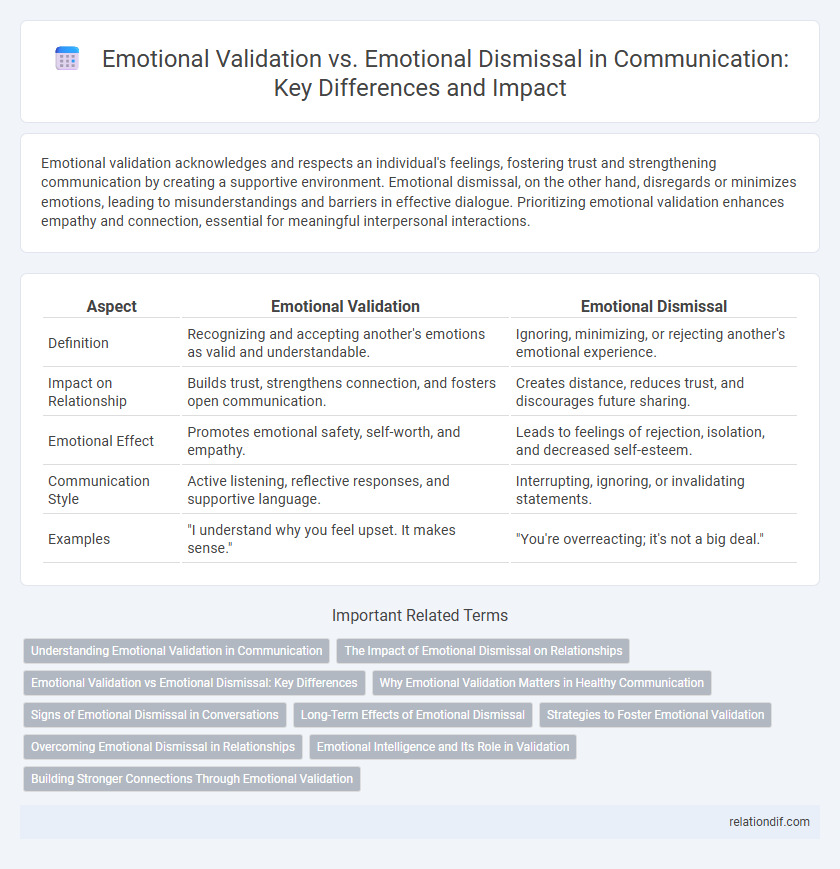Emotional validation acknowledges and respects an individual's feelings, fostering trust and strengthening communication by creating a supportive environment. Emotional dismissal, on the other hand, disregards or minimizes emotions, leading to misunderstandings and barriers in effective dialogue. Prioritizing emotional validation enhances empathy and connection, essential for meaningful interpersonal interactions.
Table of Comparison
| Aspect | Emotional Validation | Emotional Dismissal |
|---|---|---|
| Definition | Recognizing and accepting another's emotions as valid and understandable. | Ignoring, minimizing, or rejecting another's emotional experience. |
| Impact on Relationship | Builds trust, strengthens connection, and fosters open communication. | Creates distance, reduces trust, and discourages future sharing. |
| Emotional Effect | Promotes emotional safety, self-worth, and empathy. | Leads to feelings of rejection, isolation, and decreased self-esteem. |
| Communication Style | Active listening, reflective responses, and supportive language. | Interrupting, ignoring, or invalidating statements. |
| Examples | "I understand why you feel upset. It makes sense." | "You're overreacting; it's not a big deal." |
Understanding Emotional Validation in Communication
Emotional validation acknowledges and affirms another person's feelings, fostering trust and empathy in communication. It enhances emotional connection by recognizing the legitimacy of emotions without judgment or dismissal. Understanding emotional validation improves interpersonal relationships and promotes effective conflict resolution.
The Impact of Emotional Dismissal on Relationships
Emotional dismissal undermines trust and intimacy by invalidating partner feelings, leading to increased conflict and emotional distance in relationships. When one partner consistently ignores or minimizes the other's emotions, it fosters resentment and a sense of isolation, weakening the bond over time. Research shows that couples experiencing high levels of emotional invalidation report lower relationship satisfaction and greater psychological distress.
Emotional Validation vs Emotional Dismissal: Key Differences
Emotional validation involves acknowledging and accepting another person's feelings as legitimate, fostering trust and empathy in communication. In contrast, emotional dismissal minimizes or ignores emotions, which can lead to increased frustration and emotional distance. Recognizing the key differences between validation and dismissal enhances interpersonal connections and supports healthier emotional exchanges.
Why Emotional Validation Matters in Healthy Communication
Emotional validation acknowledges and respects an individual's feelings, fostering trust and openness in communication. It reduces defensiveness and promotes empathy, enabling deeper connections and more effective conflict resolution. Consistent emotional validation creates a safe environment where honest expression supports mental well-being and strengthens relationships.
Signs of Emotional Dismissal in Conversations
Signs of emotional dismissal in conversations include interrupting or minimizing feelings, such as saying "You're overreacting" or changing the subject abruptly. Ignoring or avoiding the emotional content and displaying lack of empathy through body language like eye-rolling or sighing also indicate dismissal. These behaviors undermine trust and hinder effective emotional connection, leading to communication breakdowns.
Long-Term Effects of Emotional Dismissal
Emotional dismissal in communication often leads to long-term effects such as decreased self-esteem, heightened anxiety, and difficulties in forming trusting relationships. When feelings are consistently invalidated, individuals may internalize negative beliefs about their worth and emotional experiences. Over time, this can result in emotional withdrawal and impaired mental health.
Strategies to Foster Emotional Validation
Active listening and empathetic responses are essential strategies to foster emotional validation, allowing individuals to feel heard and understood. Reflecting feelings and acknowledging emotions without judgment encourages open communication and trust-building. Creating a safe space for sharing emotions supports psychological well-being and strengthens interpersonal relationships.
Overcoming Emotional Dismissal in Relationships
Overcoming emotional dismissal in relationships requires recognizing and validating each partner's feelings to build trust and intimacy. Active listening and empathetic responses help counteract emotional invalidation, fostering a safe space for open communication. Consistent emotional validation reduces misunderstandings and strengthens relational bonds over time.
Emotional Intelligence and Its Role in Validation
Emotional intelligence plays a crucial role in emotional validation by enabling individuals to accurately perceive, understand, and respond to others' feelings with empathy and support. Validating emotions fosters trust and strengthens communication, whereas emotional dismissal can lead to misunderstandings and emotional withdrawal. Developing emotional intelligence enhances one's ability to acknowledge and respect emotional experiences, promoting healthier interpersonal relationships.
Building Stronger Connections Through Emotional Validation
Emotional validation fosters trust and understanding by acknowledging and affirming others' feelings, which strengthens interpersonal connections. Unlike emotional dismissal, which can lead to misunderstandings and weakened relationships, validation encourages open, honest communication. Consistently practicing emotional validation cultivates empathy and deepens mutual respect, essential for creating supportive and lasting bonds.
emotional validation vs emotional dismissal Infographic

 relationdif.com
relationdif.com